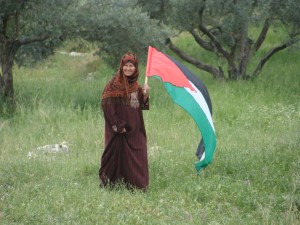
The National, March 20, 2010
Despite renewed threats of arrest and violence, more than 100 Palestinian and Israelis made the weekly march from a mosque in the West Bank village of Bil’in to the security barrier where they squared off with the Israeli Defense Forces (IDF). A handful of Palestinian youth, who covered their faces with keffiyahs and t-shirts, hurled rocks at the heavily-armed soldiers. The otherwise peaceful protest was dispersed with tear gas and stun grenades.
The absence of internationals was noted by many of the demonstrators.
On Monday, activists received the news that soldiers had posted Hebrew-language army orders during a raid conducted in the early hours of the morning. The documents declared portions of Bil’in and Nilin, another village with a resilient grassroots movement, closed military zones on Fridays between the hours of 8 AM to 8 PM.
Speaking to The National, the IDF further explained, “The Bil’in order concerns the area between the fence and the village.”
Israelis who enter the area during this time risk arrest; internationals risk deportation. As the weekly non-violent protest against the separation barrier begins shortly after the Friday noon prayer and is conducted in the area specified, the order, effective until mid-August, seems a clear attempt to stifle the voice of dissent.
But Tal Shapira, a 26-year-old painter, was enraged by the attack on her freedom and undeterred by the orders. The IDF’s latest move, she said, serves as motivation to Israeli activists like herself to show their unwavering support for the Palestinians, “[The IDF] did us a huge favor.”
Shapira first attended a protest a little over a year ago, during Operation Cast Lead. Since then, she has been arrested at two demonstrations—once on the Gaza border and once in the East Jerusalem neighborhood of Sheikh Jarrah. On Friday, she was unconcerned about the possibility of being detained. “It’s important to show that we’re not backing down,” she remarked. “They’re not going to scare us from coming here and expressing our rights.”
Sonya Soloviov, 27, said that last winter’s assault on Gaza was a turning point for her and many others. “It woke a lot of people up. On the other hand it made a lot of people move to the right. If you see the way that the government started to talk after that and the way that the police and the army act after that, you definitely see a change. I used to go to demonstrations in Tel Aviv and there were 20 policemen watching over 100 protesters. Now there are 20 protesters and 100 policemen.”
Soloviov, a student, admits that when she first heard of the army’s orders, she was frightened and hesitant to come to Bilin. But that feeling quickly passed. Of being detained she says, “If it happens, it happens.”
Her attitude is reflective of many of Bil’in’s demonstrators, who believe that arrest is an eventuality and that “offering ourselves up,” as Shapira puts it, is an act of civil disobedience.
Both women pointed to Israel’s recent row with the United States over the growth of illegal settlements, Netanyahu’s recent decision to list Hebron’s Tomb of the Patriarchs as a Jewish heritage site, and crackdowns on protests as evidence that the political climate is rapidly deteriorating
Bilin has been a flashpoint for the Arab-Israeli conflict for over five years, since the demonstrations against the separation barrier began in January 2005. Palestinians say that the wall, which does not run the 1967 border but is carved deeper into the West Bank, is an attempt to annex their land and severs them from their olive groves and other agricultural holdings. The Israelis claim that the separation barrier is a necessary security measure to guard the country against suicide bombers.
But in 2007, the Israeli Supreme Court sided with the Palestinians and demanded that the government move the wall. “We were not convinced that it is necessary for security-military reasons to retain the current route that passes on Bilin’s lands,” Dorit Beinisch, President of the Supreme Court, stated in the decision.
The weekly protest has seen scores of injuries, some serious, and one death. In August 2006, Israeli activist and attorney Limor Goldstein took two rubber-coated bullets to the head. Shot at close range after the demonstration dispersed, Goldstein survived but sustained permanent brain damage. Palestinian protestor Basem Abu Rahmah died in April 2009, after being shot in the chest with a tear gas canister.
Abdullah Abu Rahmah, chairman of the Bilin Popular Committee against the Wall, has been imprisoned since December 2009 when he was charged with arms possession for displaying empty tear gas canisters and used rubber-coated bullets—which were shot at Bilin protestors by the IDF. In a recent letter addressed to his supporters, written from the Ofer Military Detention Camp, Abu Rahmah said, “…our struggle is far bigger than justice for only Bil’in or even Palestine. We are engaged in an international fight against oppression.”
Reflecting on his detainment, Abu Rahmah continued, “I think that if this is the price we must pay for our freedom, then it is worth it, and we would be willing to pay much more.”
It appears that some Israelis and Palestinians agree.